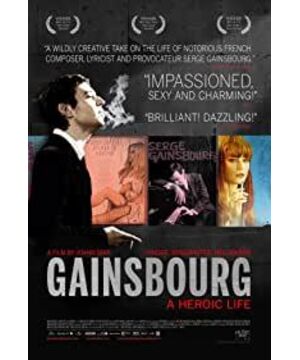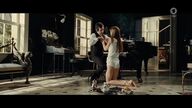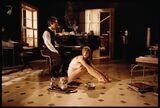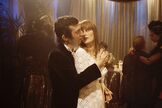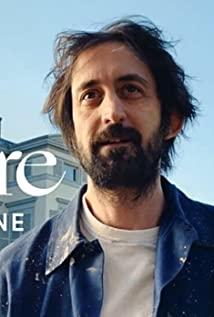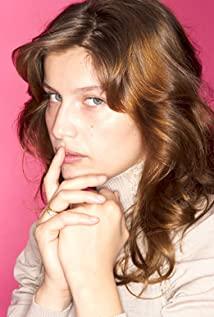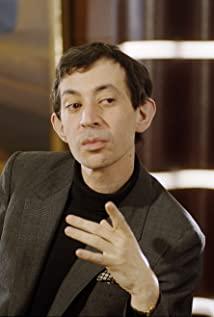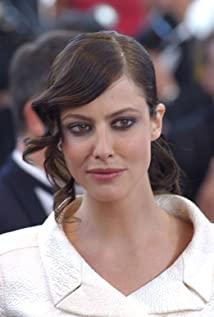/ Lao Ding Talking
about how a relative stranger has fame, influence and status, he must find a public acquaintance to refer to, such as singer Serge Gan, a singer who is not well known by non-music fans Sibu, there are "French Elvis", "Casanova of the music world", "Contemporary Baudelaire" and other titles, or "Brigitte Bardot's lover", "Jane Birkin's lover" , "Charlotte Gainsbourg's Dad" and other identity confirmations, and then there are "signs of French life", "miniatures of the 1980s", "left bank temperament", "Bobo model" and other crowns Jin Jue, and the secular title of great singers, composers, writers, poets, painters, directors, actors, etc. Even director Euan Shifa leaned in when he talked about the biopic - "It's a fable, my Gainsbourg will be Murnau's Nosferatu and Vittorio Gassman. It is a combination of Italian seductive men, even with a touch of Chaplin's tenderness and poetry."
Although "Serge Gainsbourg: A Hero's Life" (hereinafter referred to as "A Hero's Life") has a famous biography, it is not a faithful biopic in the strict sense. Inspired by the great success of Dieter Piaf's biopic "La Viegen de la Rose" in France and even in Hollywood, "A Hero's Life" takes the French singer as a biography and is much more dramatic in the plot. Ann Shifa, because of his status as a cartoonist, this film seems to be more exaggerated in a non-documentary sense, and deliberately set "French humor". And the special settings, such as the detached image of the big face and big nose that always follows, make the interest of feature films and the imagination of literary films go beyond the shackles of biopics. While it may seem a little more incomprehensible to ordinary people who have no special affection for Serge Gainsbourg, Brigitte Bardot, Jane Birkin, and Charlotte Gainsbourg, even as one Judging from an ordinary French film, "Life of a Hero" transcends the inherent elements and established formulas of general, especially Hollywood musician biopics, and its performance is also more three-dimensional because of the "extracted image", which makes the film more three-dimensional. There is more ornamental and "French taste".
The film starts with Serge Gainsbourg, who was also called Lucian as a child. He was an expert at picking up girls and a smoker since he was a child. He has the courage and sternness that is not in the same age as a child, but music does not play an important role. Obsessed with painting, but forced by his father to learn the piano, if the film focuses on this division and the shadow of his father and the rebellion that arises from it, it will be no different from a Hollywood film. "A Hero's Life" expresses his extraordinary comprehension through the young Gainsbourg's painting talent. And the big postmodern face shows that he has an extraordinary self-awareness at a young age. This ordinary-looking child is also considered a genius. He likes adventures, does not take ordinary paths, and has sex with adult mannequins. Love to look at other people's breasts, sing some yellow minor tunes, paint what he thinks of himself, and play the piano better at night than during the day even under pressure from his father, so Serge Gainsbourg has been a Jewish ghost since he was a child.
How to show that Gainsbourg really gets rid of painting and concentrates on the road of music is the most brilliant chapter of "Life of a Hero". When he became an adult, he went to the bar to play the piano, but it was just to make a living. Because of the foundation laid by his father in his early years, he was able to do it well and played with passion, which not only attracted girls, but also attracted the attention of record companies. But in the end, due to physical and psychological needs, "don't do that kind of thing on Dali's bed", plus the guidance of the "other self" who can escape, burnt all of his paintings and started playing the piano. The road to songwriting, "everything changes because of music". At first, he was very unconfident about his guitar skills and music creation. After all, compared with painting, playing guitar is a half-way monk, but "another self" jumped out at the right time and told him: "If your parents like your work, then Your job is shit... A real guitar master only uses two fingers, and you can give up the rest." So I burned the paintings I once valued so much, and I also burned my once ignorant dreams and retreats, plus On the influence of friend trumpeter Boris Vian, who burned a second-rate painter for a first-rate singer, a brilliant cynic, and a lazy but inspired composer . After all, the casualness, debauchery and sense of humor of pop music, and the grotesqueness of the 1960s, are more suitable for this 30-year-old natural wanderer.
Since changing his name to Serge (because it was said that Lucien sounded like a barber), he played guitar and piano accompaniment to the then famous female singer Michel Arnault, and he played many French women of the time. Singers write songs and have relationships with them. He is ordinary-looking and has the same language talent as Baudelaire, as well as the same understanding of verse and rhythm transformation. Minor keys such as "Lilac Station Checker" are simply readily available. It was not smooth at the beginning, but "life is an accident against fate", surrounded by a bunch of mediocre musicians, it is easy to stand out from the crowd. A four-track single, "The Java Girl", fascinated the spring. 16-year-old female singer French Golo initially only sang silly bubble songs. He composed a song "Lollipop" for her, which instantly made her It was all the rage, including Brigitte Bardot, who asked him to write the most beautiful love song in the world for her, while Serge Gainsbourg was lying beside the beauty and under the catalysis of alcohol and cigarettes, Wrote three songs in one night, including the absolutely shocking work "I Love You, I Don't Love You Anymore", which only briefly repeats the couple's conversations in bed and imitates the female orgasm moaning.
But what really changed Gainsbourg was his third wife, Jane Birkin. The two not only made Charlotte Gainsbourg (the heroine of "The Antichrist"), the daughter of a popular movie star, but also made There is a more seductive version of "I Love You, I Don't Love You Anymore" (Gainsbourg's film of the same name, starring Jane Birkin, was greatly appreciated by the new wave master Truffaut), with a little Tired, but with infinite sincerity and magnanimity of spring. They start from the Regent Club, to the hotel where Wilde stayed in Paris, and then to the mansion on the Left Bank. The relatively lasting love between the two also gave Gainsbourg a complete makeover. In the film, he did not hesitate to abandon the big-nosed " The Other Self," grew a beard and long hair at Jane Birkin's request, and a creative peak followed. In addition to his own records and the series of albums he helped his wife release, he also gave credits to artists including Marianne Faithful, Anna Karina (Godard's second wife), Catherine Deneuve, Isabelle Aja Ni and other superstars wrote songs, so it is not an exaggeration to say that the whole of France was under his influence at that time. But in fact, the departure of "another self" also made him lose himself again. Despite his growing fame, he also drank more and more wine. A kind of almost out of control creativity and self-consumption were accompanied at the same time. In his world, filled with too many feelings of sexiness, beauty, temptation and death, as well as the inflated emptiness and Lolita complex, Gainsbourg at this time is no longer Gainsbourg, but "half" It's a vegetable, half a man."
Gainsbourg ruined his body and his relationship with Jane Birkin as a result of his growing addiction to cigarettes and alcohol. And because of the "anti-Jewish storm" caused by the adaptation of "Marseille" (the French national anthem was reggae), he was threatened with death by the French right wing. This blow broke his heart, and he became a Wounded beast. His 1984 album "Love on the Beat" was a worldly success, including a song called "Lemon Incest," in which he rolls with his 12-year-old daughter, Charlotte, in the music video. ; he was on TV, lighting a 500-franc bill, or in front of Whitney Houston, saying he wanted to sleep with her. "Heroic Life" looks tragic and desolate when describing Gainsbourg during this period. He was rescued from a heart attack and called the newspaper to reveal himself. And this time his abstract "alter self" is back, the two share forbidden cigarettes, and he meets another woman because she has a "heartbreaking sense of vulnerability".
Despite the name "Heroic Life", Serge Gainsbourg is not a "hero" in the conventional sense. His rebellion and extremes are more directed to the heart and human nature than to the system or power. Therefore, the focus of the film is "life", a kind of personal existence that cannot be reproduced. Gainsbourg uses his vivid love history and coquettish ditty to make countless future generations relish such a living treasure. How boring life can be. Some say he is a real punk, some say he is a real poet, in fact, he is really the best example of the French YeYe trend (rebellious, unrestrained, cynical) of that era. And after a series of turmoil, he will not only see "another self". When looking in the mirror, he can still see many people with the same face as himself, enduring the humiliation and sorrow of life - he With his excellent insight, he turned it into music, and punctured the false illusion of that era; Gainsbourg used his own life's love - cigarettes, wine, and women's music woven to directly color that era. If Baudelaire is "the lyric poet of the era of developed capitalism", then Gainsbourg is "the lyricist of the era of post-developed capitalism". Baudelaire's neighbor.
View more about Gainsbourg: A Heroic Life reviews


